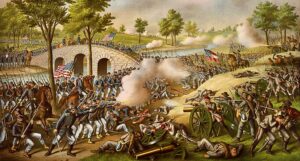Why Students Should Read All of Washington’s Farewell Address
Washington sent his Farewell Address to Congress 225 years ago this month. The speech is well-known among teachers as offering our first president’s deeply considered advice to those who would carry forward the experiment in self-government the founding generation began. Curiously, however, for a speech that in its official printed Senate version[1] occupies 26 pages, it is best remembered for only two passages. Teachers who have studied the speech in our programs often comment on the value of reading it in its entirety, to mine Washington’s many thoughtful reflections on the potential threats and necessary supports to constitutional self-government.
During the fourth 2021 summer residential session of the Master of American History and Government Program, a group of teachers who were midway in their MAHG studies gathered to discuss how MAHG had changed the way they use primary documents in their own classrooms. The first document they discussed was Washington’s Farewell Address.
All three teachers agreed on the importance of reading most, if not all, of the Farewell Address –and of other key documents in our document library. Yet the three teach in very different environments. Shannon Ross teaches general and Advanced Placement US history in Houston, at one of Texas’s largest high schools. Lauren Goepfert teaches general and AP US history on Long Island in New York, at a Title I school with a diverse population. David Widenhofer teaches at a small Catholic high school in a rust-belt community of Pennsylvania, a school which relies on donors to supplement the tuition parents are able to pay. Here is an excerpt of their conversation:
Ellen Tucker: You were telling me, David, that you teach American history across sophomore and junior year, giving you lots of time for document study.
David Widenhofer: We can not only use more documents; we can sometimes use an entire document. George Washington’s Farewell Address is a great example. Before MAHG, all I was ever exposed to was an excerpt of it—which was good stuff, but when you can take kids through the whole thing, there’s so much in there that they don’t realize the founders were actually saying.
ET: What is the standard excerpt all textbooks pull from Washington’s Farewell Address? His warning against . . .
Goepfert: “permanent alliances” with foreign countries—
Ross: —and political parties.
Goepfert: But it’s filled with so much more! Washington talks about education, about everything. Now when I teach it to my students, they read most of the document—not just what one “expert” thinks is most important.
Widenhofer: Washington discusses the virtues self-governing citizens need. We were talking in our MAHG class on the presidency today about the virtues John Adams said American education should promote. Washington speaks of this in his Farewell Address. He links religion and morality, calling both indispensable supports to self-government. In effect, he calls religion the most important virtue in a republic, since morality, he thinks, depends upon it:
Let it simply be asked where is the security for property, for reputation, for life, if the sense of religious obligation desert the oaths, which are the instruments of investigation in Courts of Justice? And let us with caution indulge the supposition that morality can be maintained without religion. Whatever may be conceded to the influence of refined education on minds of peculiar structure, reason and experience both forbid us to expect that National morality can prevail in exclusion of religious principle. ’Tis substantially true, that virtue or morality is a necessary spring of popular government. The rule indeed extends with more or less force to every species of free Government. Who that is a sincere friend to it, can look with indifference upon attempts to shake the foundation of the fabric?
For students in my school, where we can talk about religious matters openly without anybody feeling offended or excluded, this passage is really important.
Shannon Ross: One of my biggest concerns is the way we currently characterize historical figures. You either see them in their best or their worst light. I don’t think that human existence is that simple. Reading a document in its entirety helps our students dive in to see the nuance. Maybe I don’t like what this person said there, but the thing they were promoting over here was actually essential to the foundation of our nation, and can help us with current issues as well.
Goepfert: When you teach from documents, you can’t be accused of influencing the interpretation of history in one direction or another. This is what Adams said, this is what Washington said. It’s not me, nor is it a textbook author, steering your child one way or another. I’m giving students a document and they’re coming up with their own conclusions. That gives so much more ownership to the kids, allowing them to feel like they’re accomplishing something, understanding something.
[1] In the Introduction to its edition of the speech, the United States Senate Historical Office notes that, “Since 1893 the Senate has observed Washington’s birthday by selecting one of its members to read the Farewell Address. The assignment alternates between members of each political party. At the conclusion of each reading, the appointed senator inscribes his or her name and brief remarks in a black, leather-bound book maintained by the secretary of the Senate.”
https://www.senate.gov/artandhistory/history/resources/pdf/Washingtons_Farewell_Address.pdf



